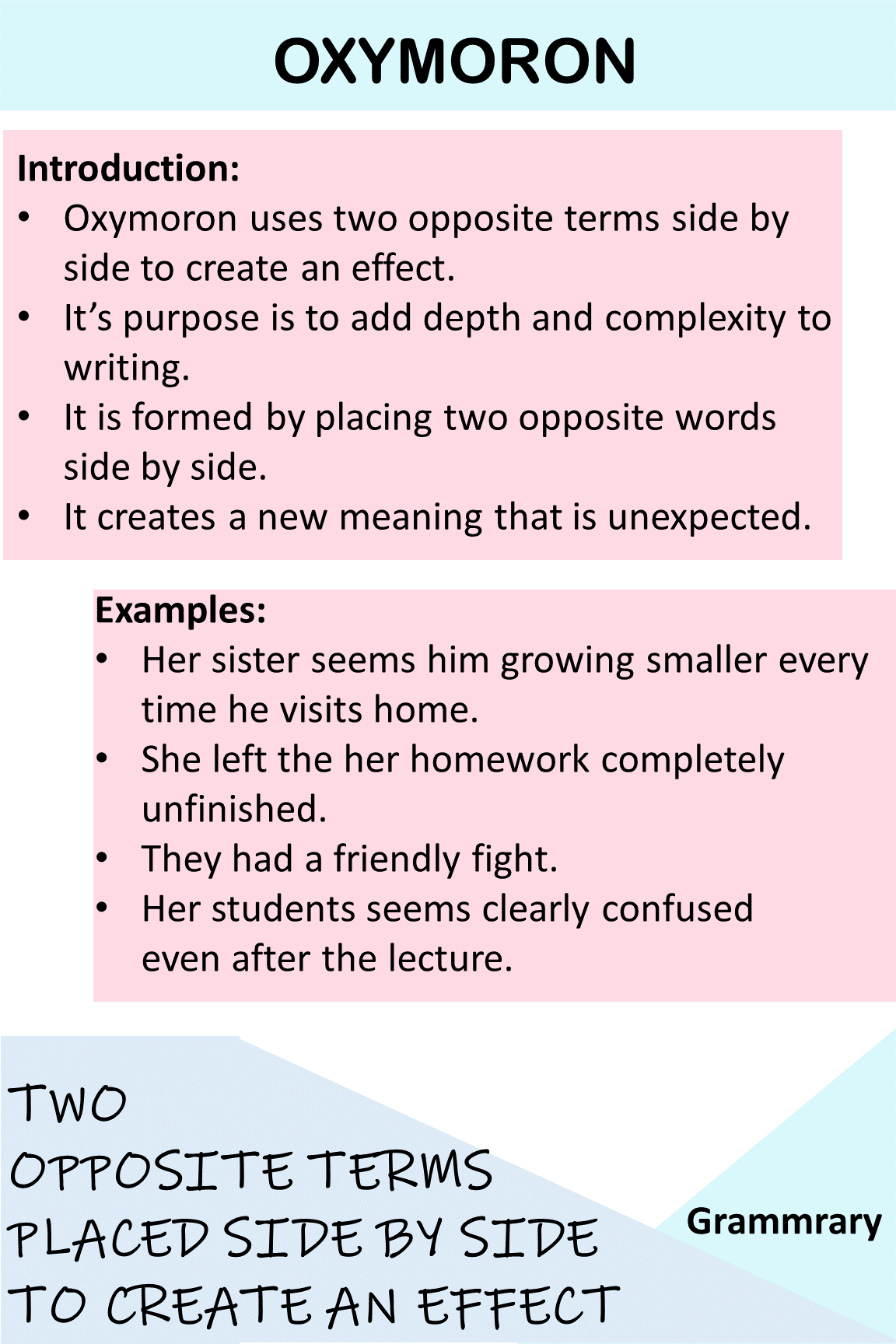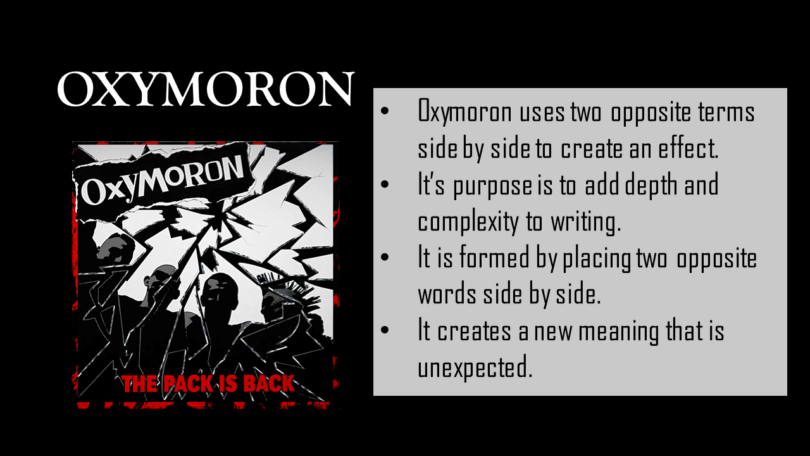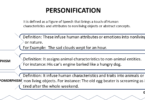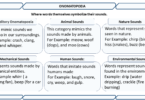What is an oxymoron?
The word oxymoron is derived from two Greek words, “oxy” means wise or sharp, and “moros” means foolish. It uses two opposite terms side by side to create an effect. Oxford Learner’s Dictionary defines an oxymoron as a phrase that combines two opposite words. According to the Cambridge Dictionary, an oxymoron means two words or phrases with opposite meanings or seemingly having contradictory meanings placed together. An oxymoron in the Merriam-Webster Dictionary is a combination of incongruous or contradictory words while in the Collins Dictionary oxymoron is a figure of speech that combines two opposite or contradictory terms or ideas.
Oxymoron describes words in a beautiful combination, in a way to grab the audience in a humorous contradictory manner. Let’s discuss the origin of the word oxymoron. As described earlier, the words it comes from two Greek words, “oxus” and “moron.” Oxy means wise or sharp, and moron means dull or foolish. Now let’s come to its origin. The words “oxus” and “morons” are two ancient Greek words. These two words, when put together, give a unique strange concept. Have you realized oxymoron is itself an oxymoron? Strange! It is a rhetorical effect, that place words together, creating paradoxes and contradictions. Contradictions may seem foolish but reveal a sharp observation about the word if you delve into deep thinking about it. “Parting is such sweet sorrow,” saying this, Juliet uses an oxymoron, creating a beautiful touch in the phrase. How beautifully Juliet paints the touch of parting!
Whether it’s for business communication or personal chats, Wittyecho offers a unique experience. It combines humor and intelligence seamlessly. People are drawn to it for its ability to make conversations more lively and memorable. As we explore Wittyecho further, you’ll discover how it enhances communication in a fun and innovative way. Join us in unraveling the charm of Wittyecho and see why it’s becoming a favorite.
Formation:
The most important thing to keep in mind while writing is to combine two “opposite” words, this is the criteria for an oxymoron. Otherwise, it would not be considered correct. These two words should look appropriate as well. They should be meaningful and analyze the combination that creates the effect and engage your audience.
Examples of Oxymoron:
Following are some examples from literature:
- “One asks for mournful melodies,” as in the poem of William Butler
- “Our eye-beams twisted, and did thread,” as used by John Donne
Examples in everyday life:
It can be used in day to day life. It makes the content look attractive. Here are the following examples:
- Her sister seems him growing smaller every time he visits home.
- She left the her homework completely unfinished.
- They had a friendly fight.
- Her students seems clearly confused even after the lecture.
Consider following Rules while using Oxymoron:
Contextual Relevance:
Consider relevancy of oxymoron according to context, it should aligns with the theme and context of your content. Use of oxymoron should be meaningful. Keep focus on coherency and juxtaposition. Oxymoron should convey a particular message and tone.
Precision and Clarity:
Oxymorons adds depth and complexity to language, avoid excessive use. Be clear and concise, let readers grasp the underlying contradiction in a beautiful way.
Emotional Impact:
Evoke strong reactions by using the emotional strength of oxymoron, giving a sense of irony, contemplation or surprise. Be strategic while using oxymoron, to highlight contrasts, create tension or underscore the complexity, bringing a deeper emotional response in audience.
Literary Effectiveness:
Try using different forms of oxymorons, include nominal, adjectival, or adverbial oxymorons. This way you can achieve varying rhetorical effects. Maintain rhythm, cadence and sound of the oxymoron to impact flow and readability of the content.
Subtlety and Nuance:
Use oxymorons with nuance and subtlety. It allows to enrich content without overshadowing other elements.
Maintain the balance between the juxtaposition of opposite terms.
Examples:
| Oxymoron | Sentence Examples |
| Pretty ugly | Her make-up looks pretty ugly. |
| True fiction | She always reads works of true fiction. |
| Original copy | Our lecturer gave us an original copy. |
| Whole piece | She ate the whole piece of pizza. |
| Virtual reality | The role of good luck in e-commerce is a virtual reality. |
| Cruel kindness | Euthanizing their Mehendi Event was completely a cruel kindness. |
| Small crowd | There is only a small crowd in Annual Dinner. |
| Sweet sorrow | She always feels sweet sorrow saying farewells. |
| Awfully good | The vlog is awfully good. |
| Open secret | Her marriage is an open secret. |
| Clearly confused | She is clearly confused about her decision. |
| Organised mess | Her room ia an organised mess. |
| False truth | She told you a false truth. |
| Friendly fight | She and her husband always have a friendly fight. |
| Completely unfinished | She left her tasks completely unfinished. |
| Painfully beautiful | Hard work required in e-commerce is painfully beautiful. |
| Awfully pretty | Her bridal dress is awfully pretty. |
| Alone together | They planned their trip alone together. |
| Growing smaller | My cupboard is growing smaller every time I visit home back. |
| Only choice | Accepting her offer was his only choice. |
| Working holiday | Saturday is a working holiday for her. |
| Unbiased opinion | She asked her wife an unbiased opinion. |
| Walking dead | After a hectic day in university, I am feeling walking dead. |
| Foolish wisdom | I am amazed at her foolish wisdom. |
| Seriously funny | Her joke is seriously funny. |

Oxymoron, Definition, Examples with Explanation







